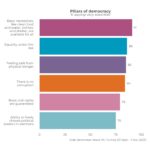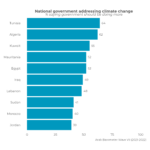This paper explores the question of what explains public opinion of women empowerment in the Middle East and North Africa. Muslim societies have often been accused of conservatism toward empowerment, stripping women of equal access to education and opportunities. However, many predominantly Muslim societies in the MENA region seem to be on the way to implement change to provide women with more rights. Prior research points to exposure to diversity as a contributor to the acceptance of a more egalitarian role of women in society. This article analyzes different mechanisms of the exposure hypothesis and whether they contribute to predicting positive public perceptions of women empowerment in the region. The empirical analyses rely on public opinion data collected by the Arab Barometer in 2018–19. The descriptive findings suggest attitudinal differences across countries, but also significant gender gaps and divergences across core explanatory factors found under the umbrella of the exposure hypothesis, such as diverse urban living, keeping religion a private matter, and connecting with the world via social media. These factors seem important to shift people’s minds and to pave women’s long way to liberalization…
Read full article at FrontiersTopics
- Charity2
- Corruption108
- COVID-1969
- Democracy29
- Discrimination12
- Economy219
- Education48
- Environment29
- Extremism19
- Freedoms44
- Gender Issues147
- Governance245
- Health42
- International Relations176
- Labor Market33
- Media31
- Migration57
- Political Institutions209
- Political Participation31
- Political Systems54
- Refugees6
- Religion118
- Security26
- Social Justice43
- Wellbeing2
- Youth74


